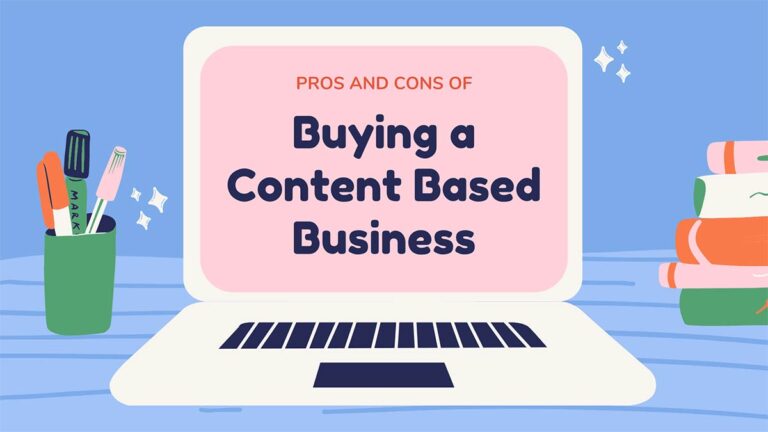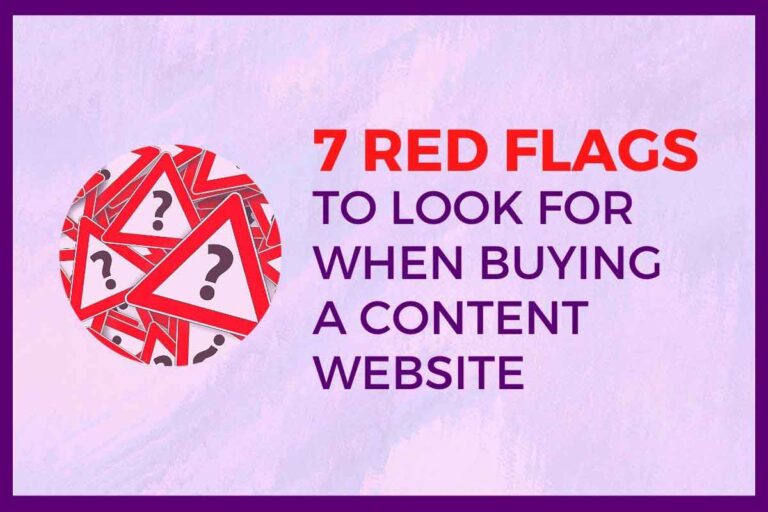Save Your Money From Possible Scams
So you’ve made the decision to buy a website and have narrowed down your choices. Before you can sign that final contract, one of the most important steps you’ll have to go through is due diligence.
But What is Due Diligence?
Due diligence can be defined as the investigative process that is undertaken before signing a legal contract. More simply put, performing due diligence means doing your research on the website you’re considering buying before anything is set in stone.
When done properly, this is what will most show you the true value of the business.
Before you sign a deal, every detail the owner has given you needs to be fact-checked and taken into personal consideration, in order for you to make the best decision.
Going through due diligence can be a complex or overlooked stage of buying a website, especially for beginners.
Fortunately, in the following blog post, we’ve put together everything you need to know about doing it properly.
Top 3 Reasons Why You Must Conduct Due Diligence Before Buying A Website

#1: You’re about to make a major financial investment.
Let’s face it: buying a website isn’t something most people should take lightly. You’re going to have to put up a certain amount of money to invest in this endeavor.
If you’re smart about the investment and perform proper due diligence beforehand, it can be a very profitable choice to make.
But for those who make a hasty decision, this can mean that the money goes down the drain. It can even mean that you’ll spend more money trying to keep up with the site than the site will be able to make you.
This is why any major investment needs to be thought through critically– and you have to be sure of exactly what you’ll be buying. Due diligence is a surefire way of verifying everything that you’ll be paying for.
#2: It Will Bring The Smaller Details To The Surface

The last thing you want to happen after buying a website is discovering something critical that had been left out of its description.
To avoid unwanted surprises, it’s best to take matters into your own hands.
Sometimes site owners will exaggerate characteristics of a site, downplay others or simply not mention things that completely change its value.
You should never take the owner’s description of a website as the “be all, end all’ of what you need to know, without verifying everything first.
By doing your due diligence, you’ll be getting a firsthand look into every detail you need to know about the website, and can make sure that everything the owner has told you is trustworthy.
#3: It will allow you to plan for and visualise your future.
Let’s say the website you’re looking to buy has had a fairly successful history. Odds are, you’re looking to maintain that success through your own handling.
This is something that requires you to know the in’s and out’s of how the website runs – you’ll need to be able to answer the following:
- How does the site stay up?
- How does the site make money?
- What are the main sources of its traffic?
Getting to truly know the website will allow you to plan for the future you have together, and give you a good estimate of the profits you could potentially earn from it.
If there’s anything you dislike about its current state that could be improved, this is something you absolutely need to have in mind before making any final decisions, because changing it will be completely up to you.
Case study:
In 2014, Spencer Haws detailed his experience of buying two websites on his blog, Niche Pursuits. While he had owned many websites, he had never purchased one.
Nevertheless, when he found a website he was interested in, Spencer made sure to do his research. On the surface, he saw potential in the website, but noticed it had a fairly low amount of profit coming in compared to the amount of traffic it was getting.
By investigating further, he came across a major red flag: the site was banned from Google Adsense, and most of the content was not original.
If Spencer hadn’t gone the extra mile in his due diligence, this fact could have slipped by him and cost him a lot in his decision. But once he was able to discover this, he was also able to get a clear view of the website for what it truly was, and how he could improve it.
In the end, he developed a strategy for dealing with this new information, and made the decision to buy the site and implement new changes.
Almost a year later, after improving its earnings, Spencer flipped the website with a grand total of $3,6998.98 earned in net income, or $82.20 per every hour he put into it.
Dave’s Experience
Let’s look at what can go wrong when you don’t do your due diligence. For blogger Dave Schneider, this meant losing $65000
and a good amount of time investment by buying a website that wasn’t worth its face value.
In his blog, Ninja Outreach, he explains his lessons learned. Dave purchased a website for $50000 through a sketchy deal – without going through a broker – before he even knew the in’s and out’s of running the business.
In the end, he sacrificed a great deal of time and $1500 extra, trying different marketing strategies for a website that couldn’t hold up at the end. It was clear that he had missed many red flags by not doing his due diligence.
Key Takeaways:
It’s estimated that more than 40% of buyers in online business transactions discover inaccurate or misrepresented features after their purchase.
Website buying and selling should generally be done through a broker to avoid scams and help the process of due diligence.
Performing proper due diligence will prepare you for any negative features of a website, while skipping due diligence or doing it improperly leads to a loss of money.
Checklist: How To Perform Thorough Due Diligence in 11 Steps
Step 1: Verify the owner’s identity and background.
Your first step is to make sure that the person selling the website is the legal owner of that domain. You can check this by using a service like DomainTools.com or Whois.com, in order to confirm the owner’s identity.
Your background check on the owner shouldn’t stop there. It’s important to do a bit of research on their reputation, records and previous transactions. This way, you can find out if they’ve had any negative website selling experiences in the past, and garner how trustworthy they are.
Step 2: Research the history of the domain.
After verifying the current owner of the domain, now it’s time to dig into its history. Using tools like the Wayback Machine can help you find out necessary information about its past.
- Has it had any reputation issues with anti-virus or anti-spam sites?
- Is or was the domain of particularly high value?
- What kind of content has it hosted in the past?
- How long ago did it launch?
Step 3: Analyze and confirm the site’s traffic and rankings.
Any traffic information the owner has given you should be verified, as the figures could be false and screenshots can be edited. Ask the seller for read-only user access to the website’s Google Analytics account to confirm ranking and traffic claims.
Use a tool like Pixel Groove’s Sandbox and Penalty Checker in order to rule out any penalties the website has earned from Google. Furthermore, use SEMRush to dig into their page and keyword rankings.
- Through which channels is the traffic coming from?
- Is this a reliable source of traffic?
- Is the owner paying for any of it?
Step 4: Perform a thorough cost and profit analysis.
You should be verifying the financials of the website. How does the website make money and how much is it bringing in? If Google AdSense or Paypal payments are a major source of income, this can be verified through limited user access to the account data.
In other cases, you can use shared computer screens and Skype. You may also have to ask for credit card or bank statements, or other financial records. Do the numbers add up?
A very important thing to find out is a rough estimate of how much it will cost to run the website as a success. What fees will you have to pay, if any, for things like licensing, content, hosting, code, design, advertising, etc? How does this compare to the flow of revenue?
Lastly, compare your offer to other transactions. Is the price fair for its value? How much are similar websites being sold for?
Step 5: Verify the site’s tech requirements.
An important thing to do your research on is the website’s current tech requirements and whether or not they are functioning.

What kind of tech does the website rely on? Is this something you’ll be able to maintain, or will you have to hire someone else to assist you?
Dig into things like the programming of the site, and any softwares required to keep it running. What softwares are these, if any? Is the coding hosted by a third party, and what fees does that entail?
Step 6: Evaluate the site’s intellectual property.
Assess whether the site has trademarked creations and/or content that will be transferred over to you legally. Verify the status of any and all registrations to make sure they are owned by the seller before they are transferred over to you.
If the site has a lot of written content, use a tool like Copyscape to verify that the content isn’t plagiarized. Are the accompanying images royalty free and licensed for use?
Verify who owns brand details like the logo or website design. Will ownership transfer to you, or are there fees you’ll have to pay for regarding this?
Step 7: Assess the time requirements and upkeep involved.
A site making $500 a month might seem great at first, but if the site requires you to spend 40 hours a week working on it in order to maintain this profit, it can lose its appeal and value. This is why it’s very important to find out the nitty gritty details of how much time needs to be spent running the site.
Furthermore, what does this time consist of? What is keeping the flow of revenue and traffic coming? Try contacting the owner for a “task audit” in order to get a closer look at the routine that keeps the site running.
Step 8: Assess any products or services currently offered.
If you’re buying an ecommerce website, or any other business that offers products or services, it’s essential that you get to know their catalog during due diligence.
- How popular are these products?
- What’s the competition like?
- What is pricing and delivery like?
- How can they be improved?
Step 9: Identify any existing contracts or employees.
Examine the relationships this website has with suppliers, independent contractors or current staff.
- Will any of its current team still want to work on the site after you buy it, and are you okay with this?
- Are there any active contracts currently in place with suppliers, and will these be affected or will the terms change?
- Are there any human resource aspects of the website you need to consider?
Step 10: Evaluate the existing customer base.

Compare the traffic rates the website has to their conversation rates and their existing list of paying customers.
Does the website come along with a list of email subscribers or registered users? Verify these numbers through a Skype call or limited user access.
What is customer support like for the business? Will you be faced with many unanswered help tickets? Who will your customers be and how will they react to any changes to the website?
Step 11: Perform necessary legal checks.
This final step is one of the most important ones you should remember to take in due diligence. Make sure the website you’re buying comes with any and all legal documents that need to be held by an online business.
Check the owner and the domain’s public records for lawsuits, debt, plagiarism and/or tax forms. You can use a UDRP search to rule out any legal liabilities regarding the domain.
When in doubt, hire a lawyer to look over any agreements – such as noncompete contracts – signed between you and the seller.
Top 3 Precautions to Take Whilst Conducting Due Diligence
#1: Beware of a website’s “blue sky” value.
A ‘blue sky’ website would be one with the potential to make money, but all of the upkeep relies on the person behind it, and not on a functioning process that can be taken over and ran by someone else.
Many times, website buyers become interested in a website that’s making decent money and getting traffic, but all of this disappears when ownership gets transferred over to them.
This is because the site was judged by its ‘blue sky’ potential. To avoid this, make sure the website has a strategy in place that you can take over and continue running.
#2: Always consider who your competitors will be.
Sometimes website owners will have two sites in the same niche, and sell one of them, planning to develop the other one further. When buying and selling businesses, this can usually be avoided through a legal agreement, but online businesses are a trickier deal.
Regardless of the seller’s intentions, make sure to do a thorough investigation on who your website will be competing with once it’s yours. This is valuable information that will be very important in your final decision.
#3: Make all transactions and conversations through a trustworthy marketplace.
The best way to help avoid nasty surprises when buying a website is making sure to use a broker that can help you in the due diligence process. Companies built for buying and selling websites will generally do their own due diligence before accepting a seller onto their platform.
They also often have protected messaging systems and an escrow payment system that serves to prevent scam deals. It is still recommended you do your own due diligence as well while buying through a marketplace, but choosing this path will already be a helpful precaution in the process.
Final Thoughts
Due diligence can seem like an overwhelming process at first, but once you lay out all the essential steps, you’ll find it’s well worth it. As previously mentioned, you won’t have to go through it alone if you find a trustworthy brokerage firm to help the process.
At BuySellEmpire, every website listed has gone through a strict screening process to ensure they’re of the highest quality. Currently, we’ve sold over 300 valuable websites through safe, successful and affordable transactions.
Our policies are in place in order to allow a selection of trustworthy sellers onto the platform. This way, buyers at our marketplace will have an easier time doing their own due diligence.
Ready to buy an established website? Join our private buyers list today, to be notified on our latest listings!






